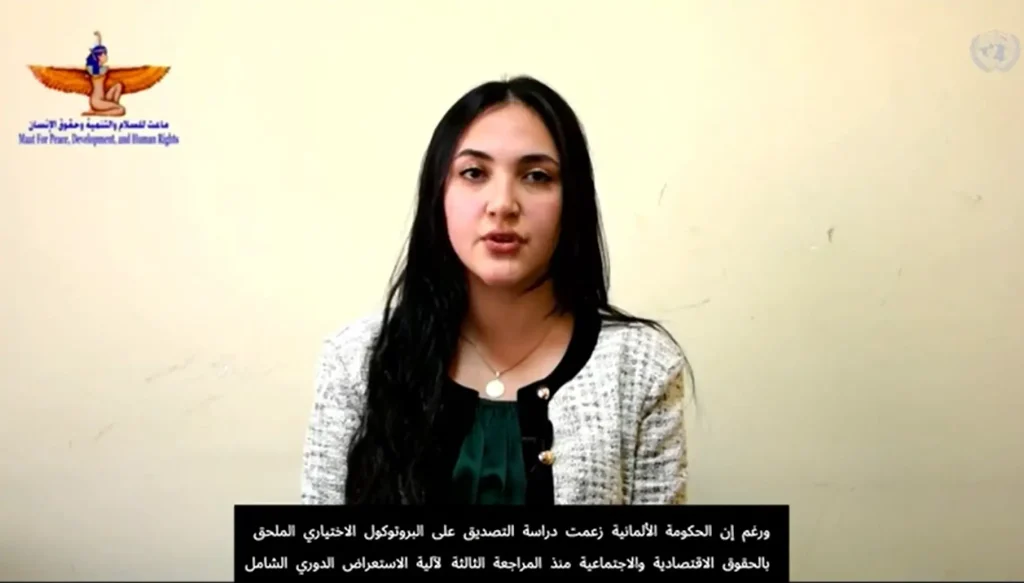Maat concludes a hearing on the proposed local administration law, with the participation of 12 parliamentarians
Reducing the number of local council members and separating the local councils election law from the local administration law. The most important recommendations
[divider style = ”solid” top = ”20 ″ bottom =” 20 ″]
Maat Foundation for Peace, Development and Human Rights concluded yesterday evening an expanded hearing on a proposed law Local Administration System, With the participation of more than 70 participants from parliament representatives, members of the supreme body of political parties, civil society leaders, local administration experts, who want to run in the upcoming local elections, representatives of executive bodies, and media professionals, with the aim of presenting the law proposal that was sent to the Egyptian parliament last month for a community discussion expanded.
The draft law is the result of a series of community dialogue sessions that Maat began last February, and these sessions included a workshop to discuss a set of principles and main texts proposed for the law, which was developed by the Foundation's Public Policy Analysis Unit, followed by a round table that brought together a group of parliamentarians, including the President The Local Administration Committee of the Egyptian Parliament, former members of the People's Local Council, and other various stakeholders.
The most important points that were discussed included whether governors are appointed or elected under the new law, and in this regard, most of the opinions of MPs and other participants supported the appointment of governors by a decision of the President of the Republic, provided that two-thirds of the members of Parliament agree that the governor is elected. In the future, and with regard to reducing the number of members of the local councils proposed by the draft, the participants preferred that the number of members of local councils be reduced, especially in light of the lack of suitable places to accommodate all members in the past, which resulted in members being absent from sessions or not being held regularly in addition to the lack of The state budget accommodates 60,000 members in local councils, and the participants stressed the imperative of the House of Representatives approving the decisions of the President of the Republic related to the establishment, cancellation or merging of the governorates, including decisions of the executive bodies related to the creation of new economic regions, and with regard to the formation of the Supreme Council for Local Administration, Most of the opinions supported that the council be headed by the prime minister, provided that it includes in its membership the lecturers and heads of the provincial local councils. Some participants also suggested retaining the Ministry of Local Development with the formation of a committee in each governorate to follow up the implementation of the local council’s decisions by the executive officials.
He also recommended the participants to expedite the establishment of the High Electoral Commission and separate the Local Council Elections Law from the Local Administration Law, and that the executive officials be chosen from among the members of the local councils. Most of the participants also supported that local council elections should be an absolute closed list, especially in light of the constitution’s guarantee in Article 80 of the representation of youth, people with disabilities, women, Copts, workers and farmers in closed lists.
The participants pointed out the impossibility of completing the local council elections before the end of 2016, especially since the completion of the elections this year will result in a constitutional vacuum in 2021 when the term of Parliament and local councils expires in the same year, especially in light of the state’s inability to bear the completion of two electoral entitlements in the same year.
The draft law is part of a draft "The Universal Periodic Review as a Tool to Improve Public Policies during the Transition", Which is implemented by the Foundation with funding from the European Union over two years. Which seeks to enhance the role of the universal periodic review to improve public policies and reform human rights in Egypt by actively involving civil society organizations, activists and media professionals in following up and calling for the necessary reform of human rights, in addition to adopting new policies compatible with international human rights standards based on the results of the 2014 universal periodic review. The project activities target 5 main regions, which include: Canal region, Sinai and East Delta region, Central and Western Delta region, Greater Cairo region, North Upper Egypt region and Southern Upper Egypt region.
You can visit the official project page for more information and updated news:
[fb_album id = ”267303286965587 ″ wp_photos =“ true ”)











